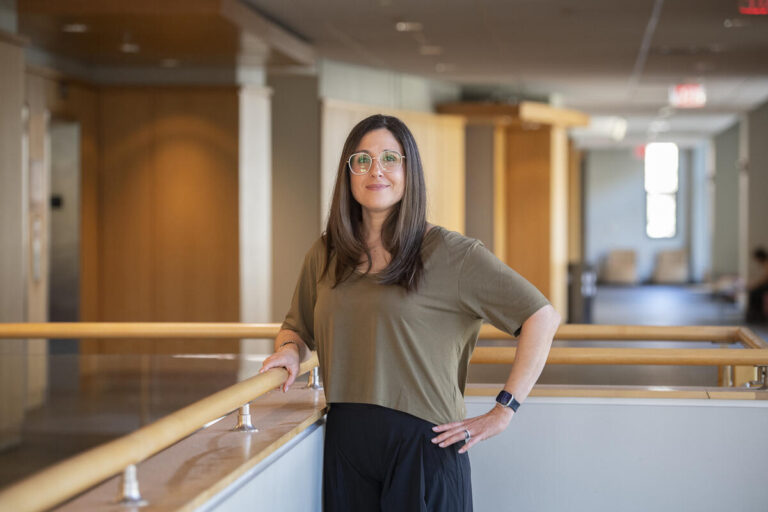Victoria Cashio, a second-year doctoral student at Virginia Commonwealth University School of Social Work, served in the U.S. Army for 14 years. She enlisted as a healthcare specialist and was named manager of behavioral health sciences in 2012.
Cashio earned an MSW through the Army-Fayetteville State University program at Fort Sam Houston, Texas, and she completed two years of clinical internship in mental health, domestic violence and substance abuse services at Tripler Army Medical Center and at Schofield Army Health Clinic, Hawaii. She also holds a graduate certificate in industrial and organizational psychology from Grand Canyon University.
Cashio spoke to VCU News about her research into the experiences of people in the gender diverse community and how data can be humanizing.
In two sentences, tell us what your research is about…and why it is important/impactful for all of us.
My research focuses on promoting equality and well-being for people who identify within the gender diverse community. Binary gender socialization has negative impacts on all of us, but within the transgender and diverse community, these social norms perpetuate stigma, discrimination, and resulting health disparities.
What inspired you to pursue this line of research?
Prior to attending VCU, my education and career in social work was primarily clinically focused. I wanted to pursue advanced research studies to do work that could help prevent social suffering and promote social justice for marginalized groups and communities. During my military service, I witnessed a shift in policies that expanded the rights of LGBTQ+ people in uniform. This progress continues to inspire me and I am committed to being an ally to the community.
Tell us about a surprise in your research journey.
I was surprised that research could be such a creative process. Since the start of my doctorate. at VCU, my view of research really broadened. “Data” can be humanizing, whether obtained from personal stories, artistic creations, or personal tools or objects that facilitate the communication process. Interdisciplinary research also expands opportunities for creativity and innovation in research. For example, at the School of Social Work, we have faculty collaborating on projects using genetic information, virtual environments, designing more inclusive spaces, and video game-based interventions. This is all very exciting!
On a more personal level, I’ve never thought about how power and privilege might play into the research process, but it just makes sense. I am definitely more aware of my identity and conscious of using research methods responsibly. In the future, I hope to gain more experience with community-based participatory research methods, as they seem to align well with my philosophical orientation and social work values.

Tell us about an obstacle or challenge you’ve had to overcome in your work.
I only have three years to complete my doctoral program. I think one of the biggest challenges for me has been staying focused on a clear thesis topic that I can complete within the given time frame. The more I learn, the more excited I get. I am continually reminded that this is only the beginning of my research career and that I will have time to answer more questions once this stage is complete.
Is there a memorable partnership or lesson that you adopted along the way?
I feel incredibly blessed by the mentorship and support I have received in my degree program. I appreciate the message I received about building a team of mentors and peers who can meet your unique needs in your educational journey. Just like the saying goes, it takes a village to raise a child. It is important to emphasize the value of community and the support of many people in achieving your educational goals.
One of the most valuable mentoring experiences I have had was from my graduate research assistant. My academic mentor, Dr. Jamie Cage, has been an excellent role model for leading team research, maintaining community partnerships, and demonstrating the skills and tools needed to stay organized throughout the research process, which is not always clearly defined and always evolving with technology. advances.
What satisfies you about the research process?
So far, I really like working in a team. The research process involves a lot, and it’s great to be able to share the work and get a variety of perspectives. We all have different experiences and are always learning from each other. Although it’s technically a “job,” the feeling of community and mutual support makes it enjoyable.
What advice would you give to undergraduates for starting their own research journey?
I would tell them to take opportunities to do research as early as possible in their educational journey. We have two undergraduate students on our team and I think it’s fantastic that they are learning and doing some of the things that I am doing as a PhD student. I think this first experience can make research less intimidating and provide an opportunity to practice more abstract concepts they learn in class.
“How I Found My Research” is a new series featuring VCU student researchers.
Subscribe to VCU news
Subscribe to VCU news at newsletter.vcu.edu and get curated stories, videos, photos, news clips and event listings delivered to your inbox.
